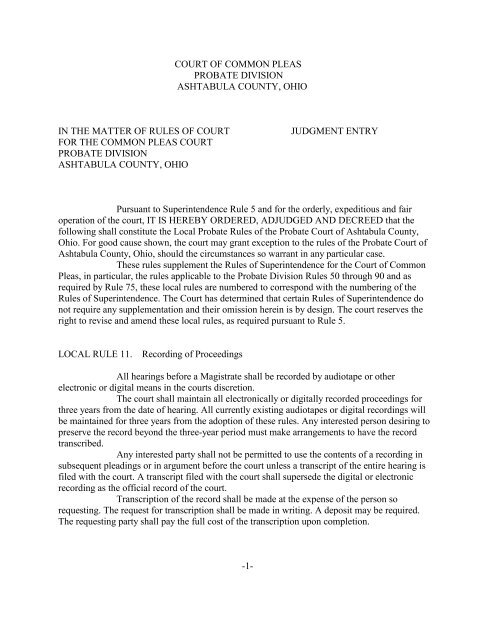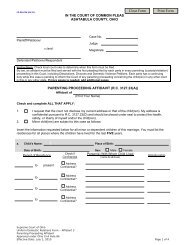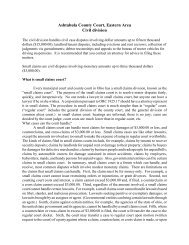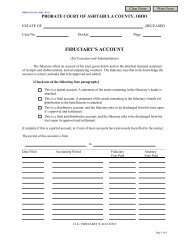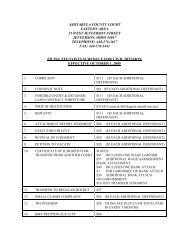pdf format - Ashtabula County Courts System
pdf format - Ashtabula County Courts System
pdf format - Ashtabula County Courts System
Create successful ePaper yourself
Turn your PDF publications into a flip-book with our unique Google optimized e-Paper software.
COURT OF COMMON PLEAS<br />
PROBATE DIVISION<br />
ASHTABULA COUNTY, OHIO<br />
IN THE MATTER OF RULES OF COURT<br />
FOR THE COMMON PLEAS COURT<br />
PROBATE DIVISION<br />
ASHTABULA COUNTY, OHIO<br />
JUDGMENT ENTRY<br />
Pursuant to Superintendence Rule 5 and for the orderly, expeditious and fair<br />
operation of the court, IT IS HEREBY ORDERED, ADJUDGED AND DECREED that the<br />
following shall constitute the Local Probate Rules of the Probate Court of <strong>Ashtabula</strong> <strong>County</strong>,<br />
Ohio. For good cause shown, the court may grant exception to the rules of the Probate Court of<br />
<strong>Ashtabula</strong> <strong>County</strong>, Ohio, should the circumstances so warrant in any particular case.<br />
These rules supplement the Rules of Superintendence for the Court of Common<br />
Pleas, in particular, the rules applicable to the Probate Division Rules 50 through 90 and as<br />
required by Rule 75, these local rules are numbered to correspond with the numbering of the<br />
Rules of Superintendence. The Court has determined that certain Rules of Superintendence do<br />
not require any supplementation and their omission herein is by design. The court reserves the<br />
right to revise and amend these local rules, as required pursuant to Rule 5.<br />
LOCAL RULE 11. Recording of Proceedings<br />
All hearings before a Magistrate shall be recorded by audiotape or other<br />
electronic or digital means in the courts discretion.<br />
The court shall maintain all electronically or digitally recorded proceedings for<br />
three years from the date of hearing. All currently existing audiotapes or digital recordings will<br />
be maintained for three years from the adoption of these rules. Any interested person desiring to<br />
preserve the record beyond the three-year period must make arrangements to have the record<br />
transcribed.<br />
Any interested party shall not be permitted to use the contents of a recording in<br />
subsequent pleadings or in argument before the court unless a transcript of the entire hearing is<br />
filed with the court. A transcript filed with the court shall supersede the digital or electronic<br />
recording as the official record of the court.<br />
Transcription of the record shall be made at the expense of the person so<br />
requesting. The request for transcription shall be made in writing. A deposit may be required.<br />
The requesting party shall pay the full cost of the transcription upon completion.<br />
-1-
LOCAL RULE 52. Computer Forms<br />
Computer generated forms must comply with the specifications and <strong>format</strong><br />
outlined by the Rules of Superintendence of the <strong>Courts</strong> of Ohio, and be generated with the exact<br />
wording as well as blank lines as they appear in standard probate forms.<br />
LOCAL RULE 53. Hours of Court<br />
The Probate Court shall be open for the transaction of business from 8:00 AM to<br />
4:30 PM, Monday through Friday, except holidays, unless otherwise determined by the court.<br />
All pleadings requiring a new case number or payment of court costs shall be filed by 4:00 PM<br />
LOCAL RULE 54. Conduct in the Court<br />
Proper attire is required for admittance to the Probate Court. Shorts, tank tops,<br />
halter tops, hats, bare feet , etc., are not acceptable forms of attire at any court hearing.<br />
LOCAL RULE 55. Examination of Probate Records<br />
Court records shall not be removed from the court, unless authorized by judgment<br />
entry. Copies of records may be obtained at cost. Confidential files may not be inspected unless<br />
authorized by judgment entry.<br />
LOCAL RULE 57. Filings and Judgment Entries<br />
Pursuant to Civil Rule 73(J) the Court in its discretion, may allow facsimile filing<br />
during regular business hours of the court. Generally, all estate filings must contain original<br />
signatures.<br />
All motions, applications and exceptions should be typewritten and shall bear an<br />
endorsement showing service of a copy upon the adverse party or party’s attorney and method of<br />
service. Motions must be accompanied by a proposed Judgment Entry.<br />
The Court will accept for filing only those pleadings which are complete.<br />
Any pleading, filing, or other document, which requires the fiduciary’s signature,<br />
shall have the original signature of the fiduciary. The attorney for the fiduciary may not sign for<br />
the fiduciary.<br />
-2-
filing.<br />
Original wills, codicils and death certificates will not be accepted for facsimile<br />
The Court will not return file stamped copies by mail, unless submitted with a<br />
return, self-addressed, stamped envelope.<br />
Any request for reimbursement of costs or other expense shall be supported by<br />
receipts, vouchers or other proof.<br />
When required on a court document, an address must be a street address, and, if<br />
applicable, any post office box numbers used as a mailing address.<br />
LOCAL RULE 58. Deposit for Court Costs<br />
Deposits for court costs for all proceedings shall be determined by the Court and<br />
the cost schedule available to the public. The business of this Court shall be conducted on a cash<br />
basis. The Court will only accept cash, money orders, cashiers’ checks, attorney, title company,<br />
or trust company checks.<br />
Upon the filing of a demand for a jury trial, the party making the demand shall<br />
file an advance deposit for costs for jury fees in the amount of $500, or such other amount as the<br />
court may determine.<br />
The balance of the costs due shall be paid at the time an account or waiver of<br />
accounting or a final judgment entry is filed. Failure to pay deposits and court costs shall be<br />
cause for removal.<br />
In all cases of decedent’s estates, civil actions, complaints to sell real estate and<br />
any other matters requiring a deposit, the fiduciary or plaintiffs will be required to maintain a<br />
positive balance in the deposit account. Filings presented to the court with insufficient funds may<br />
be refused or returned.<br />
LOCAL RULE 59. Wills<br />
The applicant for the admission of a will to probate or other persons listed in<br />
ORC 2107.19(A)(4) shall file a Certificate of Service of Notice of Probate of Will (SPF 2.4)<br />
within the time prescribed by law. Proof of service will consist of either waivers of notice of<br />
admission of the will to probate or the original certified return receipt cards as provided by Civ<br />
R. 73 (E)(3). A waiver of notice may not be signed by any minor.<br />
-3-
LOCAL RULE 60. Applications for Letters of Administration<br />
All documents necessary to open an estate must be filed at the time the estate is<br />
opened. All executors and administrators shall personally sign and file the Fiduciary’s<br />
Acceptance (SPF 4.0), prior to the issuance of letters of authority.<br />
Applicants for authority to administer an estate who are not represented by an<br />
attorney, shall exhibit to the court a picture identification and proof of current address, which<br />
must be updated within 14 days of any change.<br />
LOCAL RULE 61. Appraisers<br />
An appraiser must be experienced in appraising property in <strong>Ashtabula</strong> <strong>County</strong>,<br />
Ohio, and shall not be a member of the family, business associate or client of the fiduciary, the<br />
fiduciary’s attorney or other person interested in the estate. No person who is appointed<br />
appraiser shall, during the administration of the estate or within one year of their appointment,<br />
directly or indirectly purchase or negotiate the purchase or sale of property inventoried or<br />
appraised by them. An appraiser not having an office in <strong>Ashtabula</strong> <strong>County</strong> must affirmatively<br />
demonstrate their familiarity with the local market.<br />
Upon application and for good cause, the Court may authorize the fiduciary by<br />
order to use the <strong>County</strong> Auditor’s tax value for real property in an estate in lieu of a formal<br />
appraisal.<br />
Any asset, the value of which is readily ascertainable, is not required to be<br />
appraised, but must be included in the inventory. The market value of any motor vehicle as<br />
found in the current NADA Official Used Car Guide under the category “Av’g Retail” may be<br />
accepted as the readily ascertainable value. A copy of the appropriate page shall be attached to<br />
Form 6.1 Schedule of Assets or Form 5.1. Assets and Liabilities to be Relieved from<br />
Administration.<br />
LOCAL RULE 62. Claims Against Estate<br />
Any claim against an estate filed with the court pursuant to ORC 2117.06<br />
(A)(1)(b) shall be in the form of a complaint filed as a civil action, and heard not on its merits,<br />
but on whether the claim is accepted or rejected.<br />
Insolvency hearings may be held only in full administration and guardianship<br />
cases. Insolvency proceedings shall be commenced by the fiduciary filing a representation of<br />
insolvency accompanied by a prioritized schedule of claims. The attorney or fiduciary shall<br />
indicate the amount of the proposed payment to each creditor. The attorney or fiduciary shall<br />
obtain a hearing date on the insolvency and notify all creditors of the hearing by certified mail<br />
and bring said receipts to the hearing to be retained in the case file.<br />
-4-
LOCAL RULE 63. Application to Sell Personalty<br />
An application to sell personal property shall include an adequate description of<br />
the property. Except for good cause shown, an order of sale shall not be granted prior to the<br />
filing of the Inventory. An affidavit and report pursuant to RC 2109.45 and RC 2113.42 shall<br />
include a statement that personal property was not purchased by the fiduciary, a family member,<br />
business associate, client or agent of the fiduciary.<br />
LOCAL RULE 64. Accounts<br />
All guardians and trustees of an estate must file their fiduciary accounts each year<br />
on the anniversary date of their appointment.<br />
For estates and guardianships, vouchers or receipts evidencing disbursements<br />
during the administration of that estate must be maintained by the fiduciary, but shall not be<br />
required to be filed with the court with an accounting. The court in its discretion may require<br />
vouchers and receipts to be filed. Upon request of the Court, adding machine tapes shall be<br />
provided which reflect receipts, disbursements, and balances.<br />
If an estate cannot be closed within 6 months of the fiduciary’s appointment, an<br />
application to extend administration must be filed pursuant to statute.<br />
LOCAL RULE 65. Land Sales<br />
No land sale proceeding shall be approved by the court without the filing of a<br />
Preliminary Judicial Report pursuant to RC 163, and RC 2127.<br />
LOCAL RULE 66. Guardianships<br />
66.1 Minors. A certified copy of the minors birth certificate must be filed with the<br />
guardian’s application. Minors must appear personally in court unless for good cause<br />
demonstrated their presence is waived.<br />
When a non-parent seeks to obtain care, control, and/or custody over a minor<br />
child or assets of the minor and at least one parent of the minor child is alive, the action shall be<br />
heard and determined by the Juvenile Division of the Court of Common Pleas.<br />
The court will not accept for filing any guardianship for a minor when the sole<br />
purpose of the action is to establish residency for school purposes. Custody for school purposes<br />
is a matter to be heard and determined by the Juvenile Division of the Court of Common Pleas<br />
-5-
66.2 Annual Report. An annual Guardian Report and Statement of Expert Evaluation<br />
must be filed by the guardian of an incompetent person on the anniversary of that guardians<br />
appointment.<br />
66.3 Emergency guardianship. An application for appointment of an emergency<br />
guardian shall include an affidavit from the person alleging the emergency, including a statement<br />
of facts setting forth the nature of the emergency, and what action is necessary to prevent injury<br />
to the persons and or estate.<br />
An application for appointment of emergency guardian shall he be accompanied<br />
by the Supplement for Emergency Guardian of Person [RC 2111.49] , signed by the physician<br />
describing the circumstances which make it reasonably certain that immediate action is required<br />
to prevent significant injury to the person and or estate. Such emergency application shall<br />
include a proposed order setting forth the powers sought.<br />
66.4 Depositing of Ward’s Will. Guardians of adult wards shall deposit the Last Will<br />
and Testament, if any, of their respective ward with the court as provided by RC 2107.07.<br />
66.5 Change of Address. A guardian shall inform the court as to any change of<br />
address of the guardian or ward, within 30 days of that change in address.<br />
LOCAL RULE 71. Counsel Fees<br />
71.1 Contingency Fees. In claims for wrongful death or injuries, for conscious pain<br />
and suffering, and in claims for personal injuries to persons under guardianship or to minors,<br />
attorney fees must not be in excess of 33 1/3% of the gross award/amount. Additional<br />
compensation, however, may be granted upon a showing of special facts or complexity which<br />
must be detailed in an application seeking in excess of 33 1/3% limitation.<br />
71.2 Attorney Serving as Fiduciary. The Court assumes an attorney appointed as a<br />
fiduciary has been selected due to the attorney’s special knowledge and abilities resulting in a<br />
savings of fees to the estate, guardianship, or trust.<br />
71.3 Early Payment of Attorney Fees. Attorney fees for the administration of a<br />
decedent’s estate shall not be paid in advance from any source until the final account or final<br />
closing documents are prepared, unless otherwise approved by the Court upon prior application.<br />
71.4 Reasonable Attorney Fees. When an attorney has been employed in the<br />
administration of an estate reasonable fees shall be allowed as part of the expense of<br />
administration. Rule 1.5 of the Ohio Rules of Professional Conduct shall govern the<br />
reasonableness of fees. In determining the reasonableness of such fees, there shall be considered:<br />
1. The time and effort required;<br />
2. The complexity and difficulty of the estate and the various matters and<br />
-6-
questions involved, including the determination of Federal and State Income<br />
Taxes and Estate Taxes;<br />
3. The degree of skill required to perform the services to the best advantage of<br />
the Estate;<br />
4. Fees customarily charged in <strong>Ashtabula</strong> <strong>County</strong> for such services;<br />
5. The amount and character of assets, including non-probate assets included in<br />
the gross estate for Estate Tax purposes;<br />
6. The benefit resulting from the estate from the services;<br />
7. The experience and ability of the attorney performing the services, as well as<br />
all other relevant factors.<br />
71.5 Written Application for Attorney Fees. All applications for the allowance of<br />
attorney fees shall include an itemized statement of services performed, the date services were<br />
performed, the time spent in rendering the service and the rate charged per hour, and which must<br />
be signed by both the fiduciary and counsel.<br />
The court may set a hearing on any application for allowance of attorney fees regardless<br />
of the fact that required consents of the fiduciary or other beneficiaries have been provided.<br />
LOCAL RULE 78. Case Management<br />
78.1 Status Conference. All cases must have a general file number before a civil<br />
action may be filed. A status conference and pretrial conference shall be conducted in all civil<br />
actions, unless otherwise ordered by the Court. Within 45 days after the final answer day, a case<br />
should be set for a status hearing. A date for pretrial conference shall be set by the Court and<br />
shall generally be no more than 14 days before the trial. Trial dates shall be scheduled by the<br />
Court<br />
78.2 Pretrial Conferences. All counsel must have full authority to enter into binding<br />
orders. The following shall be submitted by the pretrial: trial briefs, witness lists, including<br />
addresses, exhibit lists, legal issues which may arise during trial, proposed jury instructions and<br />
jury interrogatories. Clients shall be present unless their presence has been excused. The court<br />
may rule on any pending motions.<br />
78.3 Notice of Litigation. Upon the filing of any legal action that effects in the state, a<br />
trust, or guardianship, the fiduciary or counsel shall file a notice of litigation with the court. The<br />
fiduciary or counsel shall so notify the court of significant events as to the litigation and advise<br />
the court within 30 days of the conclusion of litigation.<br />
-7-
LOCAL RULE 94. Inventories<br />
94.1 Decrease in Value of Inventory. In the event the fiduciary determines that an<br />
asset was incorrectly included in the original inventory or the original inventory included an<br />
incorrect valuation which results in a decrease in value, the inventory must be amended, and<br />
service of the notice of the hearing on the amended inventory effectuated unless said notice is<br />
waived in writing.<br />
94.2 Increase in Value of Inventory. In the event the fiduciary determines that the<br />
original inventory included an incorrect valuation which results in an increase in valuation, the<br />
fiduciary shall amend the inventory, but a new hearing on the amended inventory shall not be<br />
required. The fiduciary or counsel shall notify the surviving spouse and beneficiaries of the<br />
change in the inventory.<br />
94.3 Newly Discovered Assets. When newly discovered assets come into the hands of<br />
the fiduciary after the filing of the original inventory, an amended inventory is not required. The<br />
fiduciary shall report the newly discovered assets to the Court pursuant to RC 2113.69.<br />
94.4 Citations. If inventories, or other necessary proceedings are not filed by the<br />
fiduciary, within the time prescribed by statute, the Court may issue a citation, sua sponte, unless<br />
the court granted additional time. No extension of time will be allowed within which to file an<br />
inventory, except for good cause shown.<br />
LOCAL RULE 100. Redaction of Personal In<strong>format</strong>ion : Applicability of Rules<br />
Counsel has the duty to redact certain personal in<strong>format</strong>ion, including bank account<br />
numbers except for the last 4 digits, and social security numbers. The Ohio Revised Code also<br />
deems adoption, civil commitment and tax documents as confidential, and the Court will not<br />
release them from court files.<br />
All pro se persons must follow the local rules.<br />
-8-


